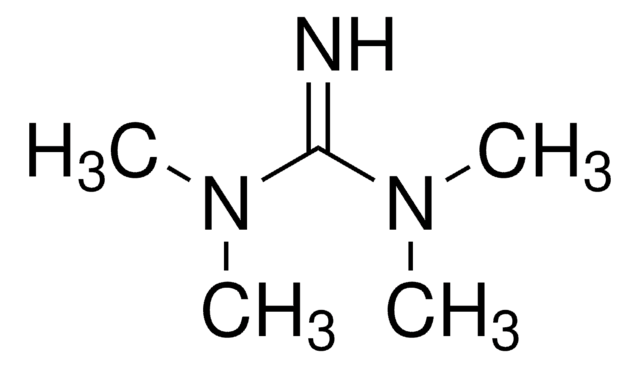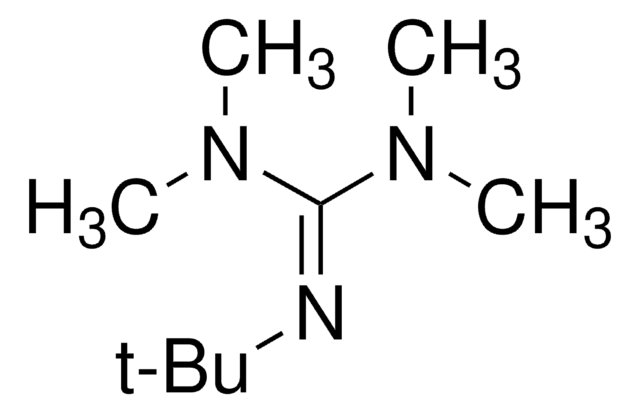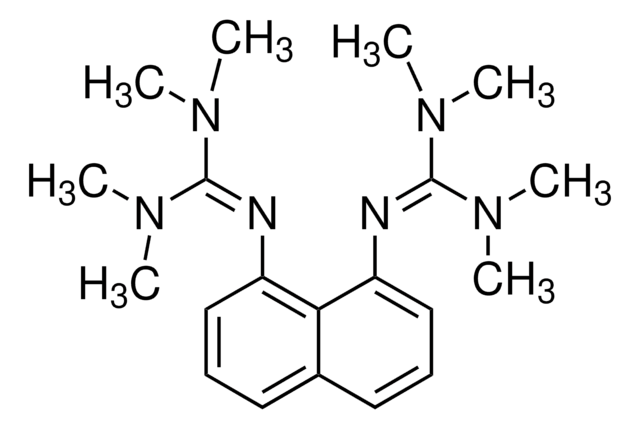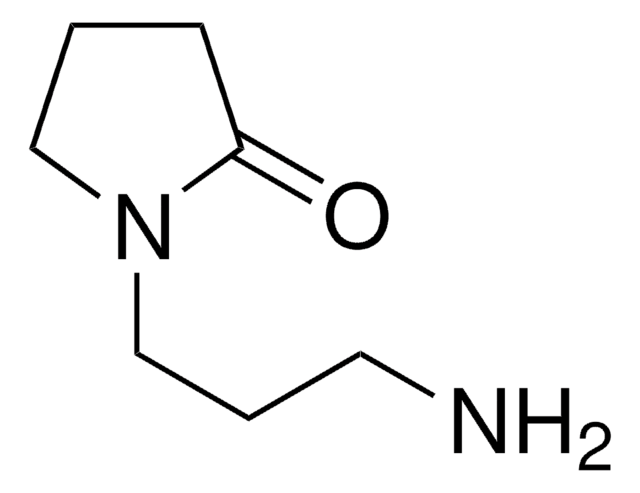136581
1,5-Diazabicyclo[4.3.0]non-5-ene
98%
Synonym(s):
DBN
Sign Into View Organizational & Contract Pricing
All Photos(1)
About This Item
Empirical Formula (Hill Notation):
C7H12N2
CAS Number:
Molecular Weight:
124.18
Beilstein:
2417
EC Number:
MDL number:
UNSPSC Code:
12352005
PubChem Substance ID:
NACRES:
NA.22
Recommended Products
Quality Level
Assay
98%
form
liquid
refractive index
n20/D 1.519 (lit.)
bp
95-98 °C/7.5 mmHg (lit.)
density
1.005 g/mL at 25 °C (lit.)
SMILES string
C1CN=C2CCCN2C1
InChI
1S/C7H12N2/c1-3-7-8-4-2-6-9(7)5-1/h1-6H2
InChI key
SGUVLZREKBPKCE-UHFFFAOYSA-N
Looking for similar products? Visit Product Comparison Guide
General description
DBN is a strong base widely used as a catalyst in organic synthesis to facilitate Michael additions and aldol condensations.
Application
1,5-Diazabicyclo[4.3.0]non-5-ene (DBN) can be used as:
- A reagent for the synthesis of β-carbolines from tetrahydro-β-carbolines via dehydrogenative/decarboxylative aromatization.
- A nucleophilic organocatalyst in the regioselective C-acylation of pyrroles and indoles by Friedel−Crafts acylation reaction.
- A superbase in the formulation of a ternary liquid-liquid phase changing system, along with hexadecane and hexanol, to capture hydrogen sulfide gas.
- A base for the preparation of 1H-quinazoline-2,4-diones from 2-aminobenzonitriles using supercritical carbon dioxide as a reactant and a solvent.
- A catalyst for the synthesis of benzothiazolones by the reaction between 2-aminothiophenols and CO2 by cyclocarbonylation reaction via C-S bond formation.
Signal Word
Danger
Hazard Statements
Precautionary Statements
Hazard Classifications
Skin Corr. 1B
Storage Class Code
8A - Combustible corrosive hazardous materials
WGK
WGK 3
Flash Point(F)
201.2 °F - closed cup
Flash Point(C)
94 °C - closed cup
Personal Protective Equipment
dust mask type N95 (US), Eyeshields, Gloves
Choose from one of the most recent versions:
Already Own This Product?
Find documentation for the products that you have recently purchased in the Document Library.
Customers Also Viewed
Arinze Akutekwe et al.
IET systems biology, 9(6), 294-302 (2015-11-19)
Accurate and reliable modelling of protein-protein interaction networks for complex diseases such as colorectal cancer can help better understand mechanism of diseases and potentially discover new drugs. Different machine learning methods such as empirical mode decomposition combined with least square
Organic Base-Catalyzed C-S Bond Construction from CO2: A New Route for the Synthesis of Benzothiazolones.
Gao Xiang, et al.
Catalysts, 8(7), 271-271 (2018)
Organic base-promoted efficient dehydrogenative/decarboxylative aromatization of tetrahydro-βcarbolines into β-carbolines under air.
Zhao Z, et al.
Tetrahedron Letters, 60(11), 800-804 (2019)
The simple solvent-free synthesis of 1H-quinazoline-2, 4-diones using supercritical carbon dioxide and catalytic amount of base
Mizuno T, et al.
Tetrahedron Letters, 45(38), 7073-7075 (2004)
Phase-Change Reversible Absorption of Hydrogen Sulfide by the Superbase 1, 5-Diazabicyclo [4.3. 0] non-5-ene in Organic Solvents.
Xu Z, et al.
Industrial & Engineering Chemistry Research, 58(4), 1701-1710 (2019)
Our team of scientists has experience in all areas of research including Life Science, Material Science, Chemical Synthesis, Chromatography, Analytical and many others.
Contact Technical Service![1,8-Diazabicyclo[5.4.0]undec-7-ene 98%](/deepweb/assets/sigmaaldrich/product/structures/120/564/5b373e23-1624-489c-8efb-692de0f96ffb/640/5b373e23-1624-489c-8efb-692de0f96ffb.png)
![1,5,7-Triazabicyclo[4.4.0]dec-5-ene 98%](/deepweb/assets/sigmaaldrich/product/structures/171/446/333d560c-cff6-4958-b489-5acfb3057cce/640/333d560c-cff6-4958-b489-5acfb3057cce.png)
![1,4-Diazabicyclo[2.2.2]octane ReagentPlus®, ≥99%](/deepweb/assets/sigmaaldrich/product/structures/366/129/a6ff4175-974d-4fac-9038-b35e508ef252/640/a6ff4175-974d-4fac-9038-b35e508ef252.png)
![7-Methyl-1,5,7-triazabicyclo[4.4.0]dec-5-ene 98%](/deepweb/assets/sigmaaldrich/product/structures/237/769/028967ef-ca63-4f22-acc9-68f135a43b9a/640/028967ef-ca63-4f22-acc9-68f135a43b9a.png)



![1,8-Diazabicyclo[5.4.0]undec-7-ene for synthesis](/deepweb/assets/sigmaaldrich/product/images/219/652/f12d7266-2d82-4869-9d8d-919b0f68de68/640/f12d7266-2d82-4869-9d8d-919b0f68de68.jpg)


